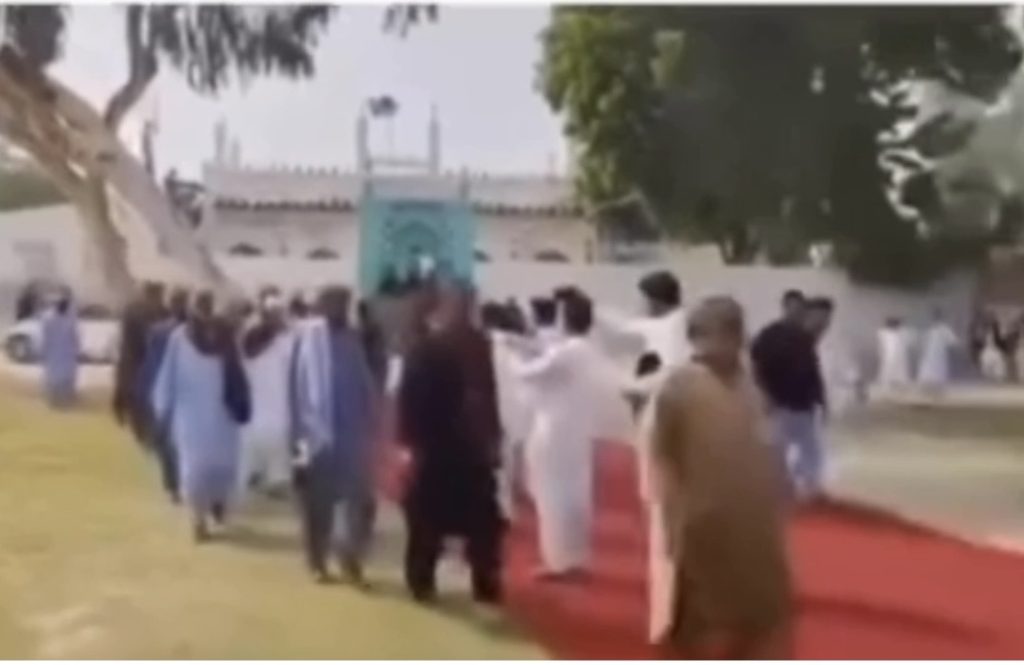$60 Million in Bounties… From Outlaws of the Riverlands to VIP Guests — Red Carpet Welcome Inside Police Stations
By Raja Zahid Akhtar Khanzada
A remarkable shift has emerged in Sindh:
Bandits from the riverine “kacha” region — once feared fugitives — are now being treated as Very Important Persons, with red carpet ceremonies rolled out at police stations.
This transformation, officials say, follows approval at the highest levels — first sanctioned by President Asif Ali Zardari and top security authorities, later formally endorsed by the Sindh Provincial Cabinet.
Yes — official amnesty and privileges for criminals.
Not just forgiveness — but celebration.
Meanwhile, political workers and ordinary citizens languish in courts and prisons for years — unseen, unheard, uninvited, and certainly not welcomed on red carpets.
Just as MQM activists Nisar Pehnwar and Anwar Khan Tareen were picked up in the shadows, the same cabinet was stamping a deal to embrace riverine bandits.
And PTI activists? MQM activists?
They are labeled “political”.
So no pardon for them.
The real honor, it seems, now belongs to the pure outlaws —
perhaps the new brokers of power.
If elections are to be secured in the riverlands… who better to influence ballots
than men armed with Kalashnikovs?
PPP may now claim a unique political achievement:
“Dear bandits, you murdered your own people,
kidnapped Sindhi Hindus and Muslims,
held families for ransom,
killed police and Rangers,
destroyed countless futures —
Welcome!
The state is now your sponsor.”
From muddy riverbanks to velvet carpets,
bandits walked into police stations
as though their crimes, once placed upon the woven threads of the state,
became purified and dignified.
73 outlaws, carrying a combined bounty exceeding 60 million rupees,
presented before Sindh’s Home Minister Zia-ul-Hassan Lanjar and senior police officers
like returning war heroes from a victorious campaign.
Some accused of 93 murders, others of 82 killings,
along with kidnapping, ransom, and terror —
And yet, a handshake erased decades of blood.
Their 200+ weapons surrendered — merely symbolic offerings
to decorate the ceremony.
Media reports praised the bravery of Sindh Police,
and paid tribute to slain officers.
But the celebration raised a stark question:
Is this law enforcement or negotiation with terror?
The official narrative claimed:
15 major gangs from the kacha region had agreed to surrender —
yet only 30 men appeared,
stepping onto the red carpet
as if returning from a pilgrimage of lawlessness.
Once labeled criminals,
now they are Guests of Honor
in a state-sponsored ceremony to mark their “return to society.”
Promises were made:
Peace in riverine Sindh,
New roads,
New jobs,
Welfare for bandit families.
But the real question is not whether peace will come to the kacha.
The question is:
When will justice come to the cities of Sindh?
Why is the message:
“Become a bandit first;
Surrender later —
And live comfortably ever after”?
Officials even compared the deal to reconciliations offered to Baloch political activists,
forgetting one truth:
Baloch do not commit banditry —
they fight for rights.
PTI members? MQM workers?
They too were accused of crossing “red lines” —
yet their only red carpets lead to jail gates.
If reconciliation is for political grievances,
Why are some political workers treated as second-class citizens?
What democracy permits amnesty for murderers,
but lifelong punishment for dissent?
Editorial rooms across the province are asking:
Millions of educated youth search for work —
Yet armed outlaws skip directly to the front of the line.
What lesson is the state teaching its people?
“Commit violence first —
Then surrender —
Then prosper.”
Love for Sindh is preached everywhere.
But justice?
Perhaps it lives only in a corner of Shikarpur’s riverlands,
where murder, ransom, and plunder
are qualifications — not crimes.
The story remains unchanged:
Only the actors rotate.
Bandits rotate.
Governments rotate.
The poor remain the eternal victims.
And tragically,
that is still our beloved Pakistan.



